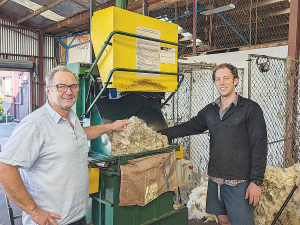As the maker of the TPW Woolpress celebrates its 50th anniversary, one Christchurch company is singing the praises of the machine, which has been a centrepiece of its operation for most of that time.
Yaldhurst Wools is a buyer, grader and exporter of fine and strong wools, which has been in operation on the western outskirts of the city since it was founded by wool exporter John Betts in 1988.
It is now run by Betts' son-in-law Ross McGuckin, whose own son Edward, 23, has now joined him in the business.
As a buyer of all wools, the Yaldhurst operation is all about grading and sorting wools for various end-uses. On an average day, they might bale 15-16 bales, and up to about 20 on a busy day.
"You get a lot of those crusty fleeces coming through the door," says Ross.
"It takes a lot to class it out."
Some of the wool comes in loose packed. While many shearing sheds now have their own TPW presses, Ross says some of it is not sorted too well and they will sort and re-bale it.
He has had a TPW press in operation for about 30 years, the current machine since 2013.
"So, it's had 12-year service and we'll probably do four or five thousant bales a year through it," he says.
"It's like anything we do: we service it every year. And it works a dream if you keep up to date with everything and you use it properly, you're fine."
Originally invented by the Perth company Theresia Perfection Welding, the TPW woolpress is said to have revolutionised wool handling in both Australia and New Zealand with its power-driven and largely automated operation. Following the passing of its founder in 2000, the company was acquired by Heiniger which now markets them alongside other shearing equipment and other agriculture products.
To celebrate the 50th anniversary, Heiniger is currently offering a free 600kg capacity TPW Backease Hoist with each new TPW Xpress Woolpress sold (details at heiniger.co.nz).
The press features inbuilt electronic scales, a unique sidepinning system and a variety of safety locks.
McGuckin's press is a three-phase model which gives it a stronger and faster action.
They usually press to 180kg which they find easy to handle. Bales that are too heavy or too light don't stack very well.
On the day Rural News visits, Edward McGuckin is sorting fleeces into various bins for each class of wool. The wool will go into the press once there's enough in a bin.
Picking out some Corriedale lamb's wool, short and about 23 or 24 microns, he explains that it would card well and be very suitable for scarves or gloves.
Another crossbreed wool he classes as B or C-grade, being a little long in the fibre and probably coming from a 12-month shear.
Shorter wools are selling for more now, he says.
“People like to shear at six months more than full now, because they find that the ewe does producing a lamb as well producing wool it. It’s really a personal preference for the farmer."
Edward said he knew he’d go into the family business since he was young, having worked there in the holidays, and also working on family sheep and beef farms. McGuckin family members still farm on land they have held since 1915 at Glenmark in North Canterbury.
While some of McGuckin’s wool is sent to the South Island’s only wool scour at Timaru, much of it is sold greasy for export, and is shipped via a company on the other side of Christchurch which can compress three standard bales into 600kg bales.
Artificial Fibres
On the state of the wool business, Ross McGuckin agrees it has fallen away a lot.
He says the “whole problem” is too many people wearing clothes made of artificial fibres.
“But our biggest fear with the industry is, everyone’s getting older. Who’s going to take on the mantle of doing it?”
With some “funny breeds” coming on, people need to know what those wools are good for, and how to class them.
McGuckin welcomes the recent Government decision to use wool in government offices for carpets and furnishing but questions whether it specifies that New Zealand wool is used.
However, a lucrative side of the Yaldhurst Wool business is its own line of top-quality woollen blankets bags and other items all made from 100% New Zealand wool but woven in Yorkshire.
Ross says they are very popular with overseas tourists.










